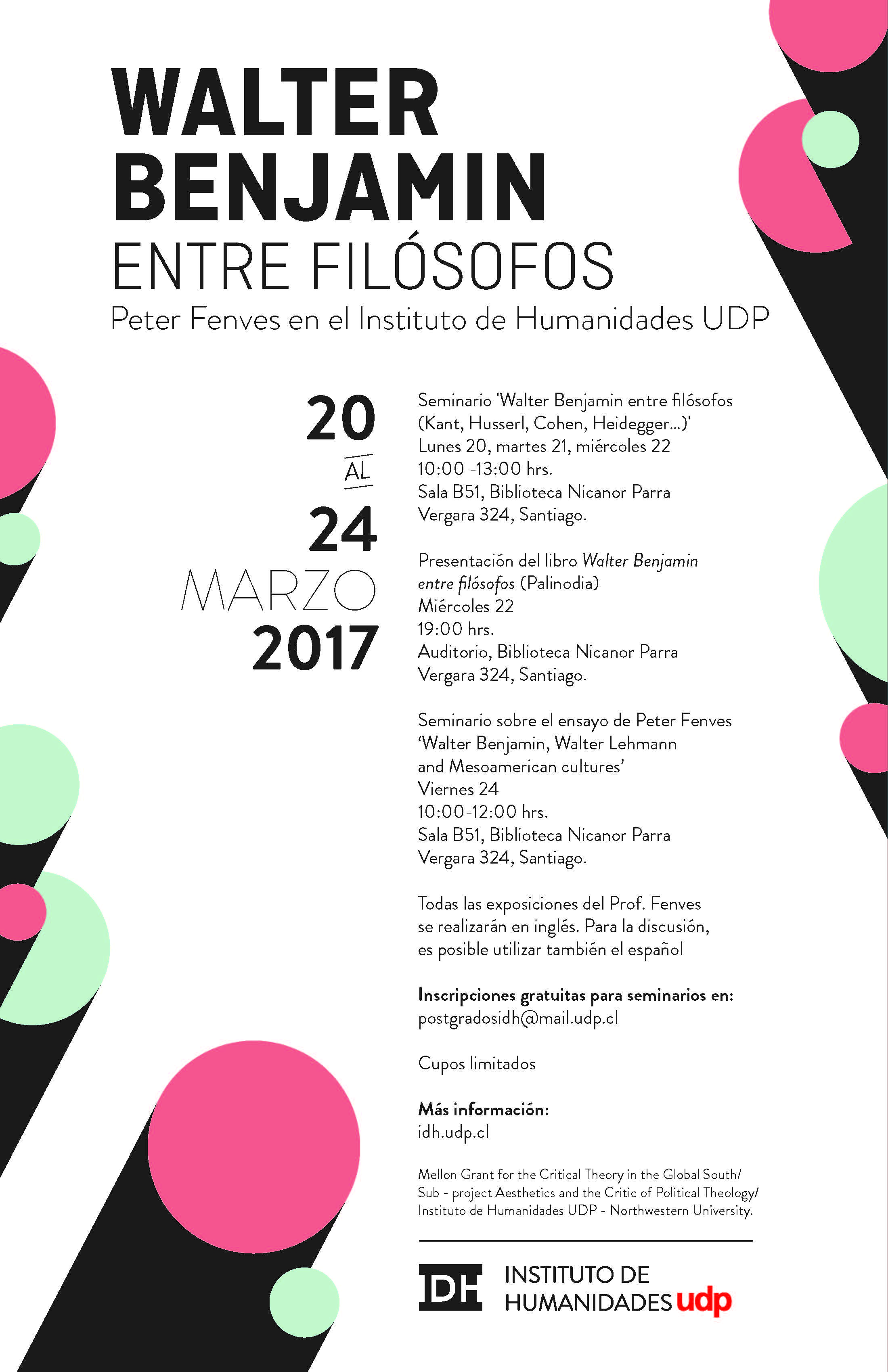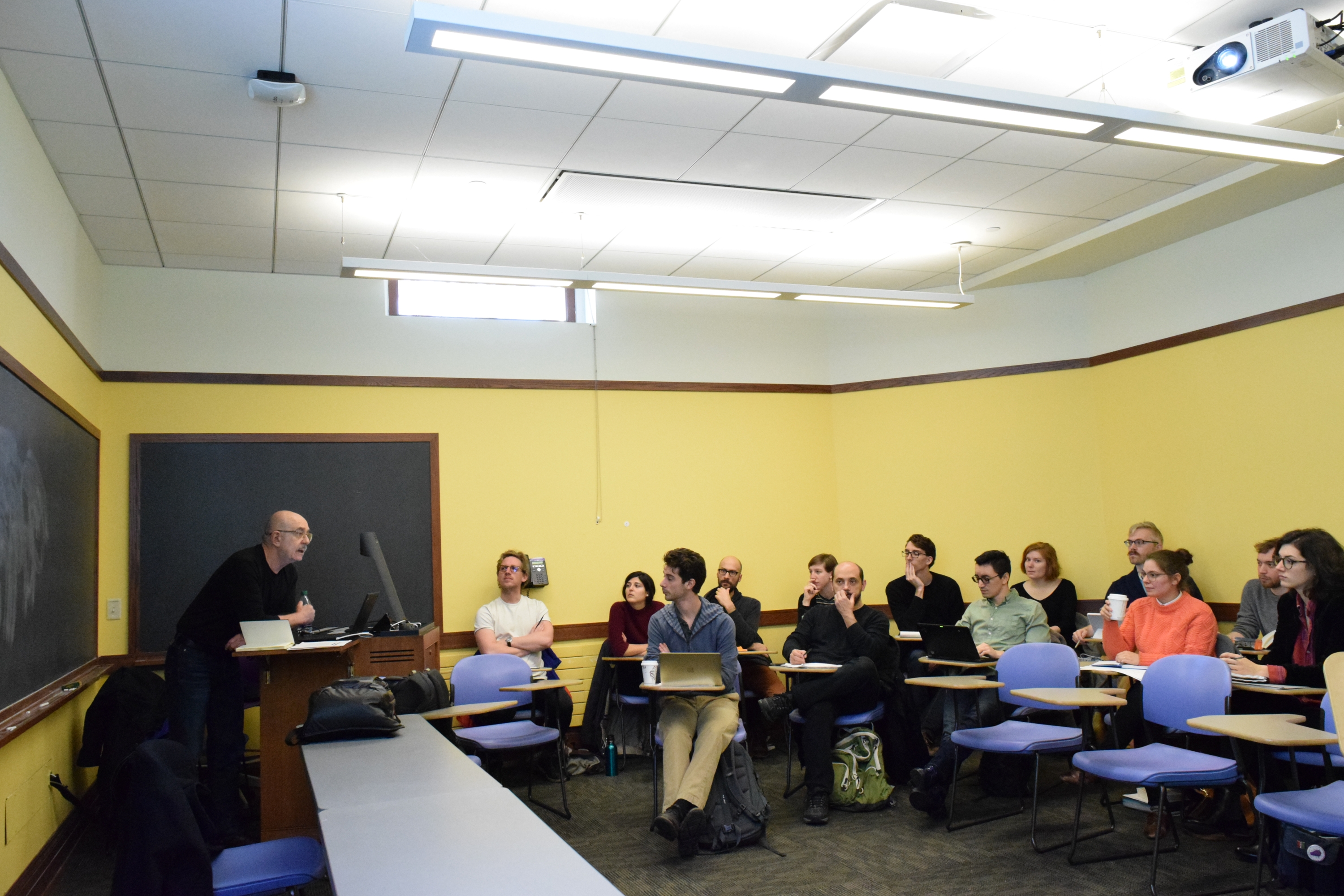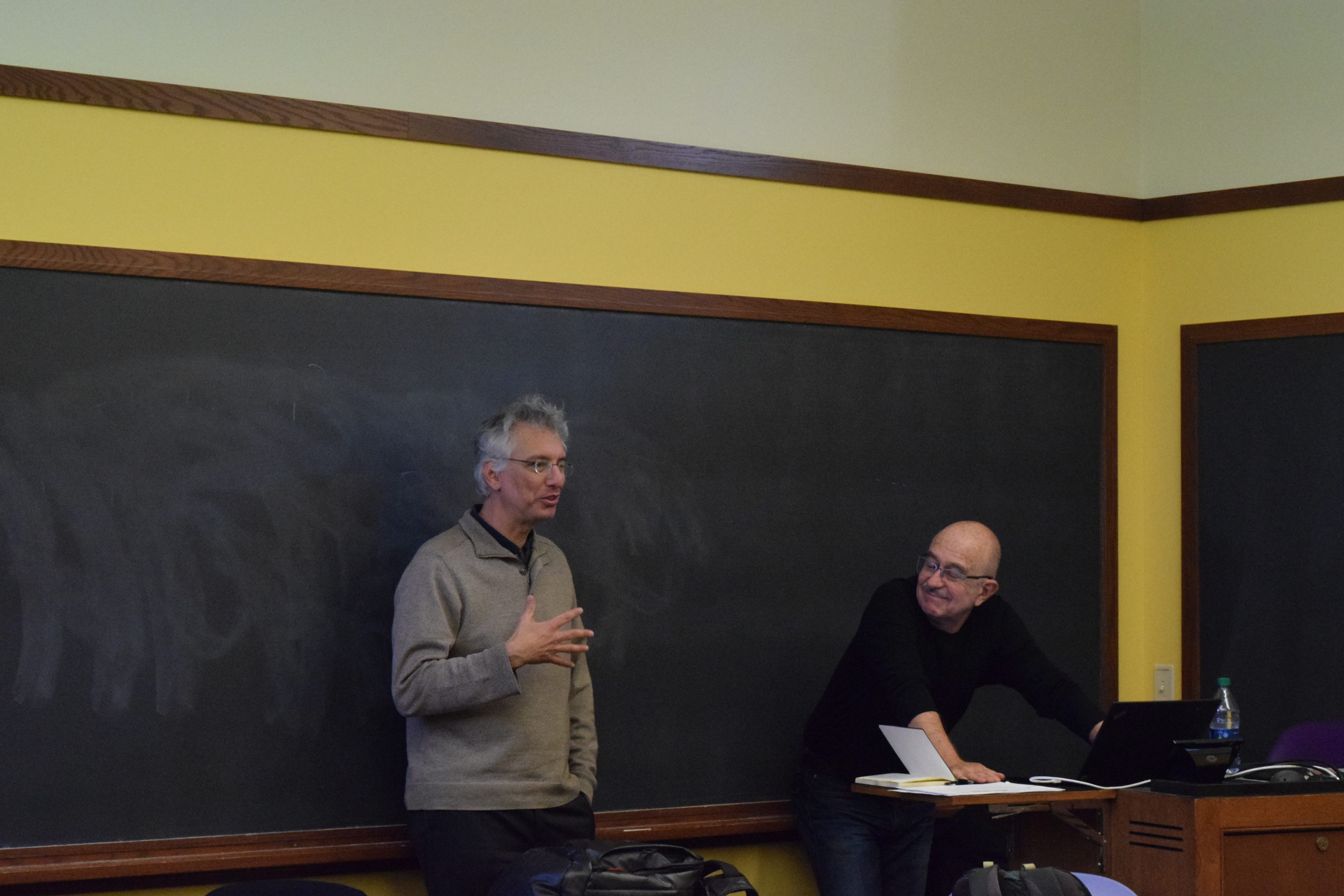Aesthetics and the Critique of Political Theology
The project Aesthetics and the Critique of Political Theology examines works of art and modes of aesthetic reflection as vehicles for critique of political theology and draws connections among European political-theological traditions, the critical work of Frankfurt and twentieth-century French and Italian thinkers, and Latin American aesthetic practices and political upheavals.
A result of the collaboration led by Peter Fenves (Northwestern) and Eduardo Sabrovsky (Universidad Diego Portales) is the English language edition of Eduardo Sabrovsky’s book De Lo Extraordinario Nominalismo Y Modernidad, which has been translated by Javier Burdman, appearing in English as Modernity as Exception and Miracle. The translation includes an introduction by Peter Fenves, “From the Transcendental, through the Extraordinary, to ‘Perpetual Peace’”.
The collaboration also included a graduate student exchange through the award of a Mellon predoctoral fellowship to support the participation of a graduate fellow based in Chile, to assist with the research for the course development during a visiting residency at Northwestern. The predoctoral fellowship was awarded to Rodrigo Farías Rivas.
In addition to fostering faculty and graduate student exchanges, the cooperation developed bilingual graduate and undergraduate courses on political theology in Latin American and European contexts, now offered as part of Northwestern's Critical Theory Certificate Program.
The group works closely together with the Mellon projects Circulating Anarchisms and Marxisms in the Andes at Northwestern and the Pontificia Universidad Católica del Perú, Lima, and Technologies of Critique, led by Paul North at Yale and Willy Thayer at the Universidad Metropolitana de Ciencias de la Educación, Chile.
Complementary workshops, lectures, seminars, and roundtables are organized and offered in conjunction with:
- The Andean Cultures and Histories Working Group
- The Latin American Biopolitics Reading Group
- The German and Latin American Critical Theory Cooperation
Faculty
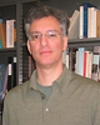 Peter Fenves is Professor of German, Comparative Literary Studies, Jewish Studies and Critical Theory at NU. He has published widely on critical theory and political theory, including his monograph, The Messianic Reduction: Walter Benjamin and the Shape of Time (Stanford University Press, 2010).
Peter Fenves is Professor of German, Comparative Literary Studies, Jewish Studies and Critical Theory at NU. He has published widely on critical theory and political theory, including his monograph, The Messianic Reduction: Walter Benjamin and the Shape of Time (Stanford University Press, 2010).
Eduardo Sabrovsky is Professor at the Instituto de Humanidades, Universidad Diego Portales, Chile. His research and teaching focus on political theology and Chilean politics. His publications include De lo extraordinario: Nominalismo y Modernidad, which examines the political-theological problem of “the exception,” and Chile, tiempos interesantes, an analysis of the current Chilean situation.
Visiting Pre-Doctoral Fellow
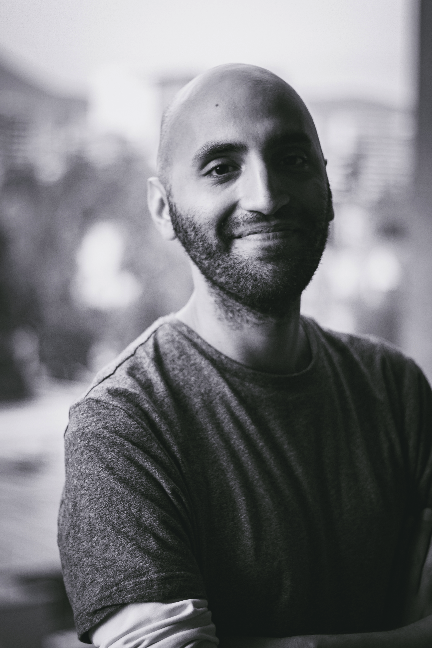 Rodrigo Farías Rivas studied Psychology and Philosophy at the Pontificia Universidad Católica de Chile. He’s a Clinical Psychologist and graduated from Philosophy with a thesis dealing with the possibility of a theoretical continuity between Wittgenstein and Lacan. In 2016 he began his doctoral studies in the joint Ph.D. Programme in Philosophy offered by Diego Portales University in Chile and Leiden University in the Netherlands, with a research project dealing with Nietzsche and Lacan. More precisely, Rodrigo is currently interested in conceiving a feasible concurrence between nihilism as a historical logic of denaturalization and jouissance as the ultimate force driving unconscious subjectivity. Rodrigo can be contacted at here.
Rodrigo Farías Rivas studied Psychology and Philosophy at the Pontificia Universidad Católica de Chile. He’s a Clinical Psychologist and graduated from Philosophy with a thesis dealing with the possibility of a theoretical continuity between Wittgenstein and Lacan. In 2016 he began his doctoral studies in the joint Ph.D. Programme in Philosophy offered by Diego Portales University in Chile and Leiden University in the Netherlands, with a research project dealing with Nietzsche and Lacan. More precisely, Rodrigo is currently interested in conceiving a feasible concurrence between nihilism as a historical logic of denaturalization and jouissance as the ultimate force driving unconscious subjectivity. Rodrigo can be contacted at here.
Rodrigo was in residence at Northwestern from late March through early July 2018. During his stay he assisted Professor Fenves in the development of project syllabi, participated in seminars, worked on his dissertation prospectus, and provided pre-publication assistance to Critical Times.
Project Syllabus
Background Reading
Dotti, Jorge. "From Karl to Carl: Schmitt as a Reader of Marx." In The Challenge of Carl Schmitt, edited by Chantal Mouffe, 92–117. London: Verso, 1999.
Hemming, Laurence Paul. "Heidegger’s Claim 'Carl Schmitt Thinks as a Liberal'." Journal for Cultural Research 20, no. 3 (2016): 286–294.
Mastnak, Tomaž. "Hobbes in Kiel, 1938: From Ferdinand Tönnies to Carl Schmitt." History of European Ideas 41, no. 7 (2015): 966–991.
———. "Schmitt's Behemoth." Critical Review of International Social and Political Philosophy 13, nos. 2–3 (2010): 275–296.
Mertel, Kurt C.M. "Two Ways of Being a Left-Heideggerian: The Crossroads between Political and Social Ontology." Philosophy and Social Criticism 43, no. 9 (2017): 966–984.
Mouffe, Chantal. "Carl Schmitt and the Paradox of Liberal Democracy." In The Challenge of Carl Schmitt, 38–53.
Pourciau, Sarah. "Bodily Negation: Carl Schmitt on the Meaning of Meaning." MLN 120, no. 5 (December 2005): 1066–1090.
Sabrovsky, Eduardo. "Carl Schmitt, enemigo de sí mismo." Revista de Filosofia 29, no. 47 (2017): 551–574.
Schmitt, Carl. Political Theology, translated by George Schwab. Chicago: University of Chicago Press, 2005.
Strauss, Leo. "Notes on Carl Schmitt, The Concept of the Political." In Carl Schmitt, The Concept of the Political, translated by George Schwab, 97–122. Chicago: University of Chicago Press, 2007.
Zarka, Yves Charles. "Le mythe contre la raison: Carl Schmitt ou la triple trahison de Hobbes." In Carl Schmitt ou le mythe du politique, edited by Yves Charles Zarka, 47–70. Paris: Presses Universitaires de France, 2009.
Zizek, Slavoj. "Carl Schmitt in the Age of Post-Politics," In The Challenge of Carl Schmitt, 18–37.
News & Events
- January 2021 | Northwestern
Workshop and Reading Group: Modernity as Exception and Miracle
With Peter F enves, Eduardo Sabrovsky, and Javier Burdman via Zoom (February 2021) as part of Aesthetics and the Critique of Political Theology
- July 2020 | Northwestern
We are pleased to announce that the English language edition of Eduardo Sabrovsky’s book De Lo Extraordinario Nominalismo Y Modernidad, which has been translated by Javier Burdman, is due to be published by SUNY Press in August 2020. The book is appearing in English as: Modernity as Exception and Miracle. The translation includes an introduction by Peter Fenves, “From the Transcendental, through the Extraordinary, to ‘Perpetual Peace’”.
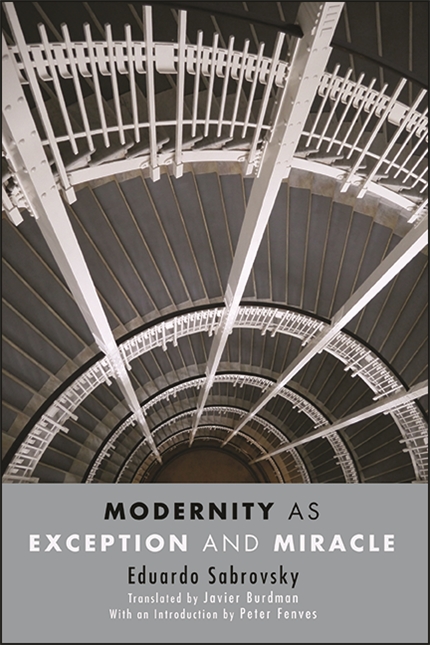 Modernity as Exception and Miracle: Proposes "the extraordinary" as a defining characteristic of modernity.
Modernity as Exception and Miracle: Proposes "the extraordinary" as a defining characteristic of modernity.
Translated from the Spanish De lo extraordinario: Nominalismo y Modernidad, this book argues that a defining aspect of modernity is an ever-increasing pursuit of, and need for, what Eduardo Sabrovsky calls “the extraordinary,” a term that encompasses both the exception and the miraculous. Sabrovsky shows the degree to which Robert Musil’s novel The Man without Qualities functions as a paradoxical paradigm of the extraordinary, and he extends the theoretical insights drawn from Musil’s magisterial work through a series of inquiries into cardinal elements of modern literature, material culture, historiography, physical science, psychoanalysis, and political theory. Sabrovsky demonstrates how the extraordinary condition of modernity emerges from the debates conducted by the last representatives of medieval scholasticism in which nominalism defeated realism, and he resituates the results of this triumph of nominalism in the writings of Friedrich Nietzsche, Theodor Adorno, Walter Benjamin, and Georges Bataille, among others.
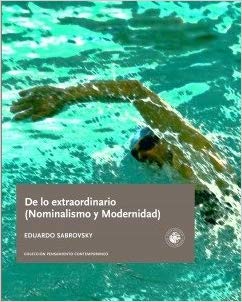 Eduardo Sabrovsky is Professor at the Instituto de Humanidades, Universidad Diego Portales in Santiago, Chile. His previous books include El Filósofo como productor: Ensayos sobre politíca y filosofía del acontecimiento; Chile, tiempos interesantes: A 40 años del Golpe Militar; and De l’extraordinaire: Nominalisme et modernité. Javier Burdman is Marie Skłodowska-Curie Research Fellow at the University of Strasbourg.
Eduardo Sabrovsky is Professor at the Instituto de Humanidades, Universidad Diego Portales in Santiago, Chile. His previous books include El Filósofo como productor: Ensayos sobre politíca y filosofía del acontecimiento; Chile, tiempos interesantes: A 40 años del Golpe Militar; and De l’extraordinaire: Nominalisme et modernité. Javier Burdman is Marie Skłodowska-Curie Research Fellow at the University of Strasbourg.Table of Contents
Preface to the English Edition
Preface to the Spanish Edition
Introduction: From the Transcendental, through the Extraordinary, to “Perpetual Peace”
Peter Fenves
1. Musil’s Death
2. The Extraordinary, History
3. The Extraordinary, Myth
4. The Works of Science
5. Nietzsche: The Incombustible in Reason
6. The Truth Is That There Is No Truth
7. The Endless Sacrifice: Art and the Production of the Extraordinary
8. Outline for an Ethics of Immortality
9. Politics of Space and of the Gaze
10. Notes on the Spectrality of Objects
11. Psychoanalysis: The Future of an Illusion - July 6, 2018 | Northwestern
Rodrigo Farías Rivas completed his spring 2018 residence as a Visiting Pre-Doctoral Fellow at Northwestern. During Rodrigo's stay, he assisted Fenves in the development of his collaborative syllabus with Sabrovsky, participated in seminars and reading groups, and worked on his dissertation prospectus, while also facilitating the visit of Aïcha Liviana Messina from Chile and providing pre-publication assistance to Critical Times. Thank you, Rodrigo, and best of luck with your doctoral work! - April 2018 | Northwestern
Aïcha Liviana Messina (Instituto de Filosofía, Universidad Diego Portales) visited Northwestern to give a colloquium on the theme of ethics and critique in and beyond the work of Maurice Blanchot. Professor Messina is expected to be a visiting scholar at Northwestern in the fall of 2019, opening up possibilties for her to interact with and contribute to the Aesthetics and the Critique of Political Theology project. - January 2018
Javier Burdman is translating Professor Sabrovsky's De lo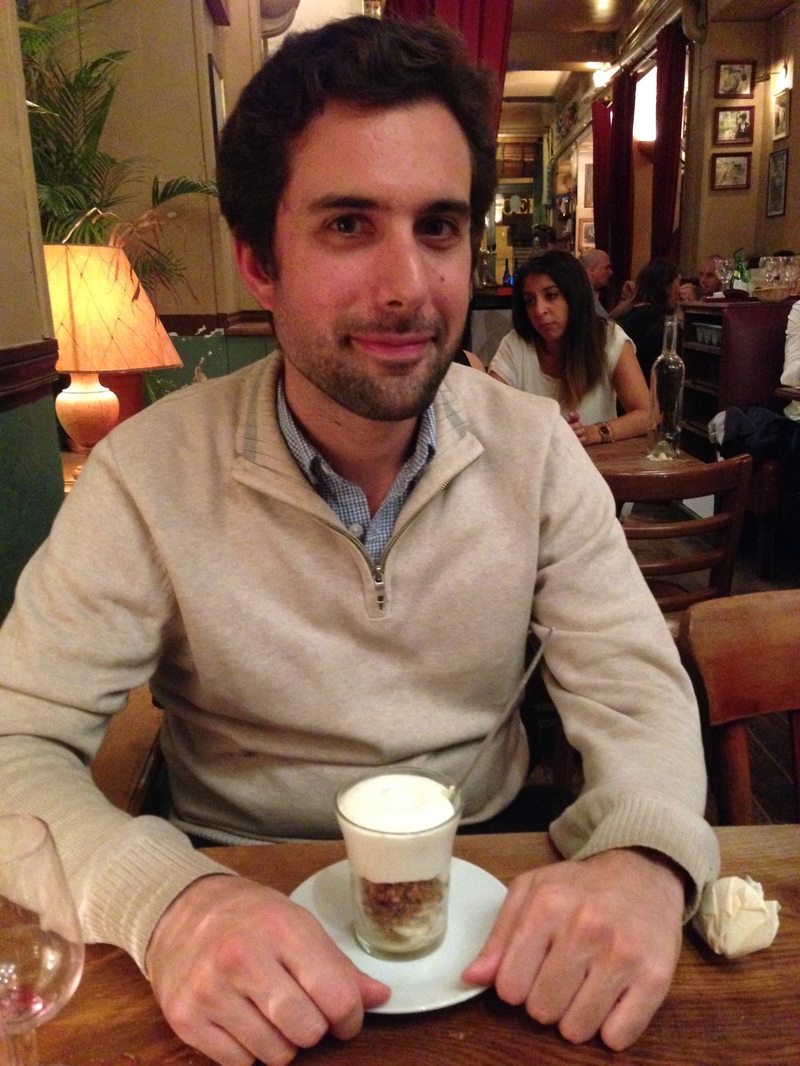 extraordinario. A first draft of the translation will be completed in February. Javier is Postdoctoral Fellow at the Cluster of Excellence "The Formation of Normative Orders" of the Goethe-Universität Frankfurt am Main. He recently completed his PhD in Political Science at Northwestern University, with a dissertation titled "Politics after Totalitarianism: Rethinking Evil, Action, and Judgment in Kant, Arendt, and Lyotard." His essays on Kant and Arendt have been published in diacritics, European Journal of Political Theory, and Constellations. His current project examines the relationship between disagreement and universality in the work of Jean-François Lyotard.
extraordinario. A first draft of the translation will be completed in February. Javier is Postdoctoral Fellow at the Cluster of Excellence "The Formation of Normative Orders" of the Goethe-Universität Frankfurt am Main. He recently completed his PhD in Political Science at Northwestern University, with a dissertation titled "Politics after Totalitarianism: Rethinking Evil, Action, and Judgment in Kant, Arendt, and Lyotard." His essays on Kant and Arendt have been published in diacritics, European Journal of Political Theory, and Constellations. His current project examines the relationship between disagreement and universality in the work of Jean-François Lyotard. - November 14-23, 2017 | Northwestern
Sabrovsky stayed on at Northwestern after the conclusion of the "Transformations of Critical Theory" workshop to work with Fenves on their project. During his stay, he conducted, with Fenves, a follow-up workshop devoted specifically to the themes of their sub-project, a workshop that brought together graduate students and advanced undergraduates from a variety of disciplines, including Religious Studies, Philosophy, German, Political Science (political theory), and Comparative Literary Studies. Sabrovsky also attended two sessions of Fenves’ graduate seminar, conducting one of them around the theme of political theology in Benjamin and Derrida. - November 10–13, 2017 | Northwestern
Professor Sabrovsky participated in "Transformations of Critical Theory," the inaugural workshop of the Critical Theory in the Global South Project. On November 13, he and Professor Fenves led a teach-in for graduate students on the theme "Carl Schmitt: As his Own Most Enemy."
Professor Sabrovsky convenes the "Carl Schmitt: As his Own Most Enemy" teach-in.
Professor Fenves responds to Professor Sabrovsky. - November 2017
The translation of Professor Sabrovsky’s book, De lo extraordinario, is underway. Javier Burdman, doctoral candidate in Political Science at Northwestern, is undertaking the translation, and Fenves will provide an "Introduction for the English-Language Edition." - Fall 2017 | Northwestern and Universidad Diego Portales
Fenves and Sabrovsky conducted linked fall-quarter graduate seminars at their respective institutions on the relation between Benjamin and Derrida, with particular emphasis on the latter’s reading of the former’s "Critique of Violence." - March 20–24, 2017 | Santiago, Chile
Professor Fenves visited the Instituto de Humanidades at Universidad Diego Portales (UDP) in Chile to initiate the Mellon collaboration with Professor Sabrovsky.